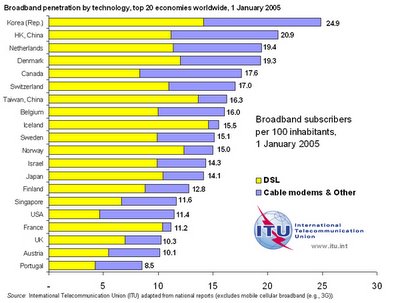Internot: the future of Access in the US
Coincidentally, the day before a classmate sent this thought-provoking story, for which this graph pretty much says it all:

Lawrence Lessig (free culture advocate and digital freedom activitst), had this to say about Internet regulation on his blog entry of January 13.
His argument is essentially that, counterintuitively, some government regulation of the Internet is required to keep the free market from quashing it -- that the Internet is an infrastructure, like a highway, that needs to be protected by governing agencies. (Lessig also points out that broadband is more expensive in the US than about anywhere else in the developed world, which may be a clue as to why the US is ranked so poorly in the above graph.)
V. relevant to digital-age public policy issues I have been studying...possibly boring to others, but like it or not, these decisions will have a significant impact on our future.

Lawrence Lessig (free culture advocate and digital freedom activitst), had this to say about Internet regulation on his blog entry of January 13.
His argument is essentially that, counterintuitively, some government regulation of the Internet is required to keep the free market from quashing it -- that the Internet is an infrastructure, like a highway, that needs to be protected by governing agencies. (Lessig also points out that broadband is more expensive in the US than about anywhere else in the developed world, which may be a clue as to why the US is ranked so poorly in the above graph.)
V. relevant to digital-age public policy issues I have been studying...possibly boring to others, but like it or not, these decisions will have a significant impact on our future.

0 Comments:
Post a Comment
<< Home